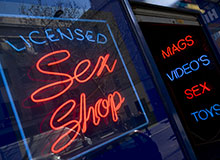 A ruling that will drastically reduce the licence fees to be paid by sex shops, following an EU directive aimed at opening up the internal market, today came under challenge at the Supreme Court.
A ruling that will drastically reduce the licence fees to be paid by sex shops, following an EU directive aimed at opening up the internal market, today came under challenge at the Supreme Court.
Westminster city council – which faces having its fees charged to the operators of 13 sex shops in Soho reduced from £29,000 pa to less than £3,000 – is appealing against the May 2012 ruling by Keith J, upheld by the Court of Appeal in 2013.
The council, which fears the decision could open the floodgates for illegal sex shops and potentially affect public sector enforcement in other areas, including the licensing of street trading and markets, is asking Lord Neuberger, Lord Mance, Lord Clarke, Lord Reed, Lord Toulson to overturn it.
The court is being asked to rule on whether Westminster’s scheme of charging fees for licensing sex shops in Soho is permitted by Directive 2006/123/EC on Services in the Internal Market, as implemented by The Provision of Services Regulations 2009.
Nathalie Lieven QC, representing Westminster, argued today that its charging regime met the terms of the Directive, which simply had the effect that it could not “load up” the cost of enforcement onto the fees that all applicants for a licence must pay, even unsuccessful ones, in order to have a “dissuasive effect”.
For successful applicants, she argued that fees which the applicant “incurs from their application” must be proportionate to the cost of the authorisation procedure as whole, which she said must include the cost of upholding that scheme.
She said: “It is fundamental to any authority’s scheme that there is compliance with it. If you don’t have that compliance system, you have not got an effective scheme.
“It is in the public interest to have the scheme and it is axiomatic that it is in the public interest to uphold the scheme.”
In the ruling under challenge, Keith J found that, as a result of the directive, local authorities are no longer able to reflect the high cost of enforcing the licensing system in the fees that sex shops are required to pay.
He said that the purpose of the directive was to create a free and competitive market for services within the European Union and remove barriers to entry to the internal market, adding: “What it means is that any fee which is charged for an authorisation, licence, approval or concession must be ‘proportionate to the cost of the procedures and formalities with which they deal’.”
He said that there was “simply no room” for the fees to include the high costs of enforcing the licensing system, and shutting down unlicensed sex shops.
As a result, enforcement costs would have to be paid out of the council’s general fund, and borne by council taxpayers.
Since February 2005, Westminster has charged a licence fee of £29,102 pa, but of that figure, £26,435 represented the costs of enforcing the licensing system, leaving a potential future licence fee of around £2,600.
Hemming (trading as Simply Pleasure Ltd) and others v Westminster City Council Supreme Court (Lords Neuberger, Mance, Clarke, Reed, Toulson) 13 January 2015






